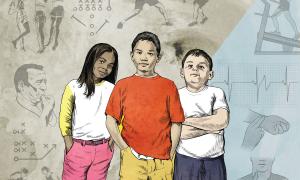Join the conversation on priority social justice, civics and democracy issues and find resources, suggestions and news.
80 ARTICLES
Children Welcome Diversity on the Playground
Adults often marvel as they watch children frolic on the playground centers. Children’s interactions appear effortless. There seem to be no barriers, no ego or self-doubt. If you want to play with someone, you simply ask him or her. It looks so uncomplicated. If a child is willing and able to partake in the fun, then there are bad guys to vanquish, princesses to be rescued and treasures to be found. A child’s imagination is the only thing placing limits on the exploration.
How Bad is Bullying at Your School? Ask Students
Today I went to an individualized educational plan (IEP) meeting for one of my middle school students. The parent reported that her son “is constantly being bullied at school." She said he is being harassed by other students because of his disability. It happens before and after school. Once, students stole his hat and put it in the trash. Another time, they took his water bottle and put sand in it.
Making Disability Explicit
In order to teach tolerance, a teacher must proactively bring in those who are typically left out of the mainstream. With the 2010 release of the HBO movie about her life, Temple Grandin may be going mainstream. But autism remains an enigma to most people. So I was thrilled when my student teacher, Eva Oliver, prepared a lesson about Temple Grandin and her work as a livestock equipment designer at the beginning of National Autism Awareness Month.
A Girl and a Word
Rosa Marcellino didn’t like being labeled “mentally retarded,” so she decided to let important people know.
Rosa’s Law Changed Words—Now Let’s Change the Prejudice
On the rare occasion that I spend time with people who are not educators, it’s inevitable that someone will drop the word “retarded.” The “R-word” has been used colloquially for decades to describe and degrade anyone or anything out of the ordinary, inferior, or somehow slow. I can still hear the snickers from my own classmates back in 10th-grade health class when we read the words “fire retardant” in our textbook.
When “Have A Nice Day” is Considered Weird
It’s not that hard to stick out in middle school. The unspoken code of social conduct is unyielding and inflexible. Anything outside of those narrow parameters is weird, and weird makes kids uncomfortable.
New Orleans Schools Shut the Door on the Disabled
A new third-grader arrives at your school. He is blind. He is autistic. He is developmentally delayed. How does your school deal with the special needs of this child?
Why I Teach: My Grandfather's Legacy
As a child I knew my grandfather was different. Grandpapa had been a sharecropper in southern Indiana. He had worked most of his adult life raising corn and pigs. His hands were big and callused. He stooped when he walked and the skin on his neck and face was scarred. His earlobes were long, stretched and fused down low at the back of his jawbone. His eyes seemed to be a bit elongated in their sockets. He was different because he looked different. You see, when he was a young child he had played with matches and caught his clothes on fire. His facial disfigurement was the price he paid for the bad judgment of a toddler.
Into the Mainstream

In third grade, Julia Horsman’s entire science project consisted of being herded outside with the other kids with disabilities and rolling soda cans down a ramp.
